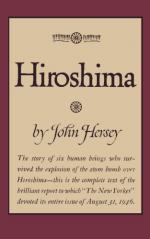|
This section contains 3,273 words (approx. 11 pages at 300 words per page) |

|
SOURCE: "The Stubborn Fact: The Exegetical Nonfiction Novel," in The Mythopoeic Reality: The Postwar American Nonfiction Novel, University of Illinois Press, 1976, pp. 93-127.
In the following excerpt, Zavarzadeh analyzes Hiroshima as an exegetial nonfiction novel.
The exegetical nonfiction novel is a fictual narrative registering the public or private events which have taken place, usually in the absence of the author, in the past. In attempting to repossess the empirical constituents of the occurred events and to recover their original configurations and mythic resonance, the exegetical nonfiction novelist subjects all the available evidence to an intensive exegesis. This kind of nonfiction novel, in its concern with past occurrences, resembles fictive novels like Proust's A la recherche du temps perdu, some historical novels, and such factual narratives as Science and Civilization in China by Joseph Needham (whom George Steiner considers "Proust's only successor"). But a radically different use of facts...
|
This section contains 3,273 words (approx. 11 pages at 300 words per page) |

|


